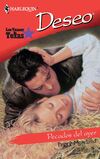Buch lesen: «The Texan's Business Proposition»
The Texan’s Business Proposition
Peggy Moreland

MILLS & BOON
Before you start reading, why not sign up?
Thank you for downloading this Mills & Boon book. If you want to hear about exclusive discounts, special offers and competitions, sign up to our email newsletter today!
Or simply visit
Mills & Boon emails are completely free to receive and you can unsubscribe at any time via the link in any email we send you.
For Justin and Cassie
The best things in life are worth waiting on…
and y’all waited long enough! May love, happiness
and friendship accompany you throughout your lives.
Contents
Prologue
Chapter One
Chapter Two
Chapter Three
Chapter Four
Chapter Five
Chapter Six
Chapter Seven
Chapter Eight
Chapter Nine
Chapter Ten
Coming Next Month
Prologue
“In war, there are no unwounded soldiers.”
—José Narosky
September 9, 1971
Preacher lay on his cot, his hands folded behind his head, staring at the shadowed canvas roof overhead. Though it was well past midnight and he was exhausted from a day spent on patrol, sleep evaded him.
From the far distance came the muffled rumble of bombs exploding. Closer was the not-so-muffled sound of snoring.
He shot a frown at the cot next to his and considered giving it a swift kick and telling his bunkmate to turn over…but decided against it. Just because he couldn’t sleep didn’t mean Fast Eddie had to join in his misery.
Fast Eddie. He snorted a laugh at the irony of the nickname. There was nothing fast about Eddie. He talked slow, walked slow. But the nickname assigned him during boot camp had stuck, the same as Preacher’s. Preacher’s real name was Vincent Donnelly, but it had been so long since he’d been called by his given name, he doubted he would respond if he were to hear it now.
The tag wasn’t one he would’ve chosen for himself, but he’d take it any day of the week over “Coward”, which is what some of the guys called him behind his back. He didn’t like the name or what it signified. He wasn’t a coward. He just had a hard time wrapping his mind around killing another human being.
Giving up on sleeping, he rolled from his cot and to his feet, hoping a walk might silence the chatter in his head. Once outside, he paused to look around. At the far end of the camp’s perimeter fencing he saw a shadowed form in the bunker and headed that way, thinking he’d shoot the breeze for a while with whoever was pulling guard duty. As he neared the bunker, he heard the metallic click of a safety being released and called quickly, “It’s me. Preacher.”
He heard another click, indicating the safety was shoved back into place, and released a nervous breath.
“Figured it was you, Preacher.”
Recognizing the deep voice as that of Pops, their team leader, he crossed to the bunker and settled down alongside his friend.
“Quiet night?” he asked.
Pops nodded, his gaze on the tall grasses that spread from the western corner of their camp. “Heard something a while ago. Thought we might have some company, but haven’t seen or heard anything since.”
“Could’ve been an animal. We spotted some wild dogs this afternoon on our way back to camp.”
“Maybe.”
Hearing the doubt in Pops’s voice, Preacher glanced his way. “You think somebody’s out there?”
Pops lifted a shoulder but kept his gaze on the grass beyond the fence. “Safer to think there is than get caught unprepared.”
Preached nodded gravely.
They sat a long moment in silence before Pops slanted a look Preacher’s way. “Still having trouble sleeping?”
Embarrassed by what some might consider a weakness, Preacher ducked his head. “Yeah. Can’t seem to stop the chattering in my head.”
“Chattering?”
“You know. Like two sides of my brain are carrying on a conversation.”
“Have you tried telling them to shut up?”
Chuckling, Preacher shook his head. “Haven’t tried that one yet.”
“Do what I do,” Pops suggested. “When I lay down at night, I close my eyes and picture home, my wife curled up beside me in bed. Relaxes my mind, my soul.”
“Wouldn’t work for me. When I think about home, it just adds more worries to the chatter already going on in my head. Things like is Karen managing okay without me? Has Vince cut his first tooth?”
Pops shifted his rifle to his left hand and slung an arm around Preacher’s shoulders. “You worry too much, Preacher. You’ve got to learn to let some of that go. Have faith that your boy will survive cutting his first tooth the same as you and every other kid in the world has. And trust your wife to handle things while you’re gone. She’s capable isn’t she?”
“You bet she is. Karen might look fragile, but she’s tough. And Vince…well, he’s pretty tough, too.” He glanced Pops’s way. “Did I tell you he’s started climbing out of his crib? Karen told me about it in her last letter.”
Pops withdrew his arm. “Next thing you know, he’ll be driving a car.”
Preacher held up a hand. “Please. Don’t be putting those kinds of images in my mind. I can find enough to worry about as it is.”
Chuckling, Pops pushed to his feet and stretched. “I need to take a leak. Mind standing guard for me?”
Preacher took the rifle Pops offered him. “Might as well. Can’t sleep, anyway.”
After Pops left to relieve himself, Preacher settled the rifle over the edge of the bunker and began slowly sweeping his gaze along the shadowed sea of swaying grass before him, while keeping his ear tuned to pick up the slightest sound. He’d made one full sweep and started a second when he heard a muffled sound behind him. He leaped to his feet, bringing the rifle up into position, its butt braced against his shoulder. With the nose of the barrel pointed in the direction the noise had come, he waited, listening.
After what seemed like an eternity, a twig snapped, the sound like a crack of thunder in the silence. Telling himself that it was probably just Pops returning, Preacher eased forward, moving stealthily in the direction the sound had come. He wanted badly to call out to Pops, verify that he was the one who had made the noise, but training and field experience had taught him the danger of revealing his position to a possible enemy.
A cold sweat beaded his forehead and upper lip, ran in a narrow rivulet down his spine. He paused a moment to drag his arm across his face to clear the moisture from his eyes, then moved on. When he reached the latrine, he flattened his back against the bamboo fence that surrounded it and waited, listening, his rifle held tight against his chest. Ten seconds. Twenty. Sweat dripped from his face, soaked the back of his undershirt. Thirty. Forty.
Keeping his movements slow and easy, he leaned to peer around the opening into the latrine. Ice filled his veins at the scene before him. Pops lay sprawled on the ground, still as death, while a Vietcong, dressed in the standard black pajamas the enemy wore, straddled him. The Vietcong lifted a hand high, and moonlight bounced off the blade of the knife he clutched.
Preacher opened his mouth to yell at the man to stop, to let Pops go. But no sound came out. Frozen by fear, he watched in what seemed like slow motion, as the hand started down, the tip of the blade aimed at Pops’ chest. The chatter started in his head again, one of the voices his own, the other that of the rancher who had bought him and his buddies a drink in the Texas bar, prior to them beginning the first leg of their journey for Vietnam.
“You boys scared?” the rancher asked bluntly.
“Yes, sir,” Preacher admitted. “I’ve never shot a man before. Not sure I can.”
The smile the rancher offered Preacher was filled with understanding, his wink that of a father reassuring his son. “Oh, I ’ magine you’ll find it easy enough, once those Vietcong start shooting at you.”
But the rancher was wrong, Preacher thought as he watched the blade slowly arc down, drawing nearer and nearer Pops’s chest. Pops, the man who had trained Preacher, stood by him, defended him when the other’s had called him a coward, was about to die, and Preacher couldn’t pull the trigger to save him.
He can’t die, Preacher thought desperately. Not here, not like this. He had a wife waiting for him at home, a baby on the way.
Setting his jaw, he yanked the rifle to his shoulder and looked down the barrel, fixing the Vietcong’s head between the cross-hairs. But as much as he wanted to save Pops’ life, he couldn’t bring himself to pull the trigger.
Anger built inside him, a red-hot inferno that fired his blood, roared in his ears. Taking the stock of the rifle in one hand and the barrel in the other, he opened his mouth and charged. The feral sound that spewed from deep inside him ripped through the night air like a machete. Before the Vietcong had time to react, Preacher dropped the rifle over his head and jerked it back against his throat.
The Vietcong flew backward, losing his grip on the knife. The weapon hit the ground less than a foot from Preacher’s boot and he kicked it out of reach. Before the man could scramble up, Preacher swung the rifle up to his shoulder and aimed it at the Vietcong’s face. He saw the hate in the man’s eyes…but not a trace of fear.
Behind him Pops moaned, stirred. Preacher started to glance back, wanting to make sure that Pops was all right, but as he did the Vietcong slid a hand beneath his shirt.
Fearing the man had a weapon concealed beneath the black tunic, Preacher stabbed the nose of his rifle against the Vietcong’s chest. “Don’t move!”
His lip curled in a sneer, the Vietcong ignored Preacher’s order. Preacher saw the butt of a handgun appear a split second before its nose was pointed at him.
The blast that followed was deafening, echoing around and around the fenced area. Preacher stumbled back a step, his gaze frozen on the Vietcong’s face. He saw the surprise that lit the man’s eyes, watched as the life slowly faded from them. He glanced down at the man’s chest where blood oozed from a gaping hole and gulped back the nausea that rose to his throat.
He heard a shout from outside the fenced latrine and knew the shot had raised an alarm in camp. The pounding of feet that followed assured him the soldiers were up and assuming their positions.
A hand lit on his shoulder, squeezed. He knew without looking it was Pops.
“You okay?” Pops asked.
Preacher swallowed hard, nodded. “Yeah. You?”
“Knot on my head is all, thanks to you. A second more and he would have slit my throat.”
Fast Eddie appeared in the opening to the latrine, half-dressed, his feet bare. “Y’all okay?”
Pops nodded, then gestured toward the Vietcong sprawled on the ground. “Enemy penetrated our perimeter. Order a full sweep of camp to make sure he was alone, then check on the guards on duty. I’ll get a detail together to take care of the body when I’m done here.”
Fast Eddie looked from the dead Vietcong to the rifle that Preacher held, and his eyes shot wide. “You made the kill, Preacher?”
Preacher opened his mouth, then closed it and dropped his chin.
“You have your orders, soldier,” Pops said tersely.
Fast Eddie snapped to attention. “Yes, sir.” He took one last look at Preacher, then turned and jogged away.
Preacher squeezed his eyes shut, but the image of the man lying at his feet with his life’s blood pouring from his chest remained fixed on the back of his lids. He’d killed one man to save the life of another. What gave him the right to decide who lived and who died? He wasn’t God.
As if reading Preacher’s mind, Pops tightened his grip on Preacher’s shoulder. “Don’t go beating yourself up over this. When he put on the uniform, that soldier knew he was laying his life on the line, the same as you and I did the day we put on ours.”
Preacher dragged an arm across his eyes. “Doesn’t make it right.”
“Wars are fought with only one rule in play. Kill or be killed.”
Preacher set his jaw, his anger returning. “I hate this damn war. Hate what it does to people, the suffering it’s caused, the lives it’s taken.”
Pops tightened his arm around Preacher and turned him away from the sight of the dead Vietcong. “This war’s no different from any of those fought before it. It’ll be the same for those yet to be fought.”
Preacher jerked to stop, dragging Pops to a halt, as well. “How do you deal with it?” he cried in frustration. “How can you sleep at night, knowing people are dying all around you?”
“It’s like I said before. I close my eyes and picture home. My wife, my son. It’s them I’m fighting for, their safety, their freedom.”
“And what happens when it’s over? When you go home? Will you just forget everything you’ve seen, what you’ve done? Erase it all from your mind like it never happened?”
Pops shook his head sadly. “I don’t know, Preacher. Right now all I can do is focus on making it home. The rest I’ll worry about once I’m there.”
He took the rifle Preacher still held. “You’re a good man, Preacher. Of all the soldiers I’ve served with, you’re the only one I can say with confidence will leave this godforsaken war with the same principles and standards he arrived with.”
Preacher shook his head. “I don’t feel like the same man. I feel…I don’t know, scarred somehow.”
Pops nodded grimly. “I read a quote somewhere. Can’t remember who said it, but it went something like this. ‘In war, there are no unwounded soldiers.’ At the time I remember thinking the guy who said it must have been crazy. Now I think I understand what he meant.”
“Yeah,” Preacher said. “Me, too.”
Squinting his eyes against the darkness, Pops looked off into the distance a long moment. “Preacher, I know you’re going to find this hard to believe, but the soldiers who make it home are going to be burdened with a greater responsibility than the ones they’ve shouldered here.”
Preacher looked at him in confusion. “How’s that?”
His smile sad, Pops patted him on the back. “Focus on making it home, Preacher. When you get there, you’ll know what I mean.” Turning, he walked away. “You’ll know, Preacher,” he called over his shoulder. “You, of all people, will know.”
One
Now, this is the life, Sally Gregg thought to herself. Swaying palm trees, a private pool, a house with every amenity known to man.
She tipped her sunglasses down and craned her neck to peer at the structure behind her. Not just a house, she corrected. It was a friggin’ mansion. Nestled in Houston’s prestigious River Oaks subdivision and situated on two lush acres, the house rivaled its neighbors in both design and size.
Too bad the interior doesn’t reflect the traditional style of the exterior, she thought with regret. She supposed the ultramodern design suited her boss, but the mix of chrome and black lacquer didn’t do a thing for her.
Thankfully her boss had limited the changes he’d made after purchasing the house to the inside and had left the exterior and landscaping alone. As a result, the backyard was an oasis, as soothing to the soul as it was to the eye. A clever blend of French doors and floor-to-ceiling windows offered spectacular views of the pool and landscaped lawn beyond from inside the house.
Sure beats the heck out of the view of the parking lot from my apartment window, she thought with more than a little envy. With a sigh, she pushed her sunglasses back into place and settled on the lounge chair again.
But she’d have a house someday, she promised herself. Maybe not as large and grand as her boss’s and definitely not one with a River Oaks address, but she’d have a home.
The only thing that kept her from having one now was money. Thanks to the generous salary her employer paid her and her own prudent lifestyle, she was steadily chipping away at that particular roadblock. Having learned frugality the hard way—by necessity—she knew how to stretch a dollar until it all but screamed for mercy. As a result she was close to becoming debt free, while still managing to squirrel away money toward a down payment.
Which she’d already have, if not for Brad.
She scowled at the reminder of her ex. She never should have given him the money, she thought bitterly. She, better than anyone, knew he’d never pay it back. Brad was, and always had been, fast with a promise and slow on delivery.
It was bad enough that she’d wasted four years of her life with a man who didn’t care for her, but then he’d decided to prolong her misery by showing up unannounced on her doorstep every time he needed money. For some stupid reason, he’d gotten it in his head that she owed him, which was insane, considering she had been the sole breadwinner throughout their marriage. Now she was forced to constantly move, in order to escape his mental abuse and the demands he made on her. As a result of the forced nomadic lifestyle, she had few possessions and even fewer friends.
She stubbornly pushed the thoughts of her ex from her mind. She wasn’t letting Brad, or anything, for that matter, spoil her stay in paradise. And house-sitting for Vince Donnelly was exactly that. Paradise.
She shivered deliciously, thinking the stars definitely had been shining on her the day she’d snagged the job as Vince’s executive secretary. Besides house-sitting for him when he was out of town—a perk she hadn’t expected when she’d accepted the job—she received an above-average salary and more benefits than any of the other positions she’d applied for after moving to Houston. Granted, Vince wasn’t the easiest man to work with. He was obsessive, demanding and micromanaged all of his employees. But he was also successful and drop-dead gorgeous.
Not that his looks had factored into her accepting the job as his secretary, she thought judiciously. Money was her motivator.
She remembered the shock she’d experienced when she’d walked into his office for her job interview and gotten her first look at the owner and founder of Donnelly Consulting. Based on the size and value of the company, she’d expected an older man. One with at least a spattering of gray at his temples.
What she’d found was a thirty-six-year-old hunk with the disposition of a grizzly bear.
With a shake of her head, she sat up and reached for the bottle of sunscreen, squirted a blob on her palm. Thirty minutes, she promised herself as she smoothed the cream over her arms, chest and legs, then she’d go inside and tackle the tasks her boss had e-mailed her overnight.
Grimacing, she mentally added workaholic to her boss’s faults. The man was relentless. In the four months she’d worked for him, she’d never known him to take so much as a day off, which was a shame, since his business trips took him all over the world.
With a rueful shake of her head, she lay back and closed her eyes again. If she were required to take business trips all over the world, she’d darn well stay over a day or two and see the sights. Tokyo. Paris. Venice.
She smiled dreamily, easily able to imagine herself floating on a gondola along the canals of Venice.
“Sally!”
She shot up from the chair, to find her boss standing in the open French door.
“Vince,” she said dully. Remembering how she was dressed, she snatched up a towel and whipped it around her. “What are you doing home? You aren’t supposed to be back until Monday.”
“Cut the trip short. Wasn’t feeling good.”
She peered at him more closely and had to admit he did look kind of sick. His face was pale, his shoulders stooped, his clothing rumpled. “Did you pick up a bug or something?”
Shaking his head, he rubbed a hand across his chest. “Heartburn. Something I ate must not have agreed with me.”
She started toward him, praying whatever he had wasn’t contagious. “When did you get sick?”
“Hit me last night. Caught a red-eye home.” He braced a hand against the doorjamb as if needing its support as he turned inside the house. “Did you update the spreadsheets on the Holmes deal?”
She rolled her eyes, but dutifully followed him inside. “No.”
He shot her a frown over his shoulder. “Didn’t you get my e-mail?”
“Yes. This morning. I planned to do it this afternoon.”
“I need that report now.”
Before she could remind him it was Saturday and technically her day off, he clamped a hand over the back of a chair and bent double with a groan.
“Vince?” When he didn’t reply, she moved around him to peer at his face and saw that his skin had turned a deathly gray and his breathing was labored. “Vince? Are you okay?”
He pressed a hand against his chest. “Can’t breathe,” he choked out.
She bolted for the kitchen, calling over her shoulder, “Stay right there. I’ll get you a glass of water.”
A step short of reaching her destination, she heard a loud crash behind her. Quickly reversing her direction, she raced back and found Vince sprawled on the floor and the stainless-steel end table that usually stood beside the chair on its side less than a foot from his head. She burned a full twenty seconds wringing her hands, trying to think what to do, then noticed his cell phone clipped at his waist. Snatching it from its holder, she punched in 911.
“911 operator. What is your emergency?”
She pressed a shaking hand to her forehead. “I’m not sure. I’m at my boss’s house. He said he wasn’t feeling well. I went to get him a glass a water. He must’ve fainted or something because now he’s lying on the floor.”
“Is he conscious?”
She shifted her gaze to Vince’s closed eyes and gulped. “No.”
“Your name?”
She frowned in confusion. “What?”
“Your name.”
“Sally Gregg. Please,” she begged. “Send an ambulance. I don’t know what to do.”
“Your relationship to the victim?”
“What difference does that make?” she cried. “The man needs help!”
“Try to remain calm, ma’am.”
She drew in a deep breath and slowly released it, telling herself that losing her cool wasn’t going to help things. “We’re not related. He’s my boss.”
“The victim’s name?”
“Vince Donnelly.”
“Address?”
She rattled off Vince’s address.
“Phone number?”
“For God’s sake!” she snapped. “I don’t want you to call me, I want an ambulance! He could be dying!”
“Ma’am, I understand your concern, but I’m required to collect this information.”
“It’s 555-423-6597,” she said in a rush. “I’ll leave the front door open.”
Before the operator could ask her any more ridiculous questions, she threw down the phone and ran to unlock the front door, then raced back and dropped to a knee beside Vince.
“Vince? Vince, can you hear me?”
She held her breath, watching his face for a reaction and bit back a moan when not so much as an eyelash fluttered. “Vince, please,” she begged. “Hold on. An ambulance is on the way.”
There was a rap on the door.
“Houston Fire Department! Is there an emergency?”
Sally jumped to her feet. “In here!”
A man appeared, followed on his heels by a second man carrying a bag.
The first to arrive moved to stand with Sally, while the other dropped down beside Vince and began pulling equipment from his bag.
“What happened?” the man beside Sally asked.
She wrung her hands. “I don’t know. He just returned from a trip. Said he wasn’t feeling well. I went to get him a glass of water. He must have fainted, because I heard this loud crash. I ran back and found him lying on the floor.”
“He’s breathing,” the second fireman reported.
A third man appeared and dropped down at Vince’s head to support his neck while the second fireman fastened what looked like a thick, padded belt around it.
“What’s he doing?” Sally asked in concern.
“Applying a C-collar,” the man at her side explained. “In the event he injured his neck when he fell, the collar will prevent further damage.”
Gulping, Sally watched as the men continued to work, one attaching a heart monitor to Vince’s chest, the other wrapping a blood pressure cuff around his arm.
“EMS!”
Sally snapped up her head to see two more uniformed men rushing into the house, carrying a stretcher.
The man beside her quickly shifted his attention to the EMS team and reported, “Male, midthirties, possible cardiac arrest. Witness reports he passed out and hit his head on the table. We’re holding C-spine, have applied oxygen via nonrebreather at fifteen liters per minute. Blood pressure 178/96, pulse is 102 respirations at 24 rapid.”
Wide-eyed, Sally scooted out of the way and watched while the EMS team positioned a backboard beside Vince. On the count of three, the fireman rolled Vince to his side, and the EMS team slid the backboard into position. After lowering Vince to the backboard, they cinched straps around him to secure him. On the count of three again, the men lifted him onto the stretcher.
“You’ll need to meet the ambulance at the hospital,” the fireman told Sally, as the other men gathered their equipment, preparing to leave.
Sally took a step back. “Oh, I’m not family,” she said. “I’m just his secretary.”
The fireman gave her a slow look up and down and Sally cringed, knowing what he must think. A woman at her boss’ house on the weekend wearing a towel wrapped around her? No, this didn’t look good, at all.
The EMS team started toward the front door with Vince. The fireman placed a hand in the middle of Sally’s back, urging her to follow.
He stopped on the porch. “Can you notify his family?”
“The only relative I know of is his mother, and she’s confined to a nursing home.”
“Then you’ll need to go to the hospital.”
“But I’m not family,” she said again.
“Admittance is going to need whatever information you have to offer.”
Leaving Sally on the porch, the fireman went to help the others load Vince into the back of the ambulance. One of the EMS team hopped into the back with Vince, while the other ran to climb behind the wheel of the vehicle. With lights flashing and siren screaming, the ambulance took off down the circle drive and bounced onto the street.
As Sally watched the vehicle disappear from sight, she sent up a silent prayer for Vince, then whispered another for her own forgiveness.
She might’ve prayed for Vince, but it was really her own welfare she was worried about.
If anything happened to her boss, she knew she’d be out of a job.
Sally spent the next eight hours in the hospital’s emergency room. Upon her arrival, she’d provided the desk clerk with what information she could about Vince, which proved enough to allow them to locate his records, as well as his doctor. Technically, she could have left then, and with a clear conscious. But some weird sense of duty made her stay. Since she knew of no family or friends of Vince’s to call to sit in her stead, she felt obligated to remain and await news of his condition.
During her long vigil, she read every magazine in the waiting room, drank four cups of coffee, made numerous trips to the restroom, one to the snack machine, and all without receiving any word on Vince’s condition. Fearing the worst, she gathered her courage and approached the reception desk. The staff had changed at three o’clock, and a different woman now sat behind the desk, having replaced the clerk Sally had spoken to previously.
“Excuse me,” she said, in order to get the clerk’s attention. “Is there any word on Vince Donnelly?”
“Are you family?”
She shook her head. “His secretary.”
“The doctor’s still with Mr. Donnelly. I’ll let him know you’re here.”
Sally murmured her thanks and returned to her seat. Desperate for something to help pass the time, she picked up a tattered paperback novel someone had left behind and began to read. As luck would have it, it was a mystery, her favorite genre, and two pages into the book, she was totally engrossed by the story.
“Are you Sally?”
She snapped up her head to find a doctor standing in front of her. Gulping, she set the book aside and slowly rose. “Y-yes. I’m Sally.”
“I’m Dr. O’Connor, Vince’s physician.” He gestured toward a door. “If you’ll come with me.”
Sally followed him through the door and down a short hall.
Unsure what to expect, she asked uneasily, “He’s going to be all right, isn’t he?”
“That depends on Vince.”
Considering that a nonanswer, she followed the doctor into one of the curtained-off examining rooms, where Vince lay, his eyes closed, his hands folded over the hospital gown that covered his chest. An IV tube ran from the back of one hand to a bottle hanging from a hook at the head of the bed. A white plastic bracelet circled his left wrist. She stared hard at his hands and breathed a sigh of relief when she saw the rhythmic rise and fall of his chest beneath them.
She sent up a silent prayer of thanks that he was still alive and her job hopefully secure, then whispered to the doctor, “Why hasn’t he regained consciousness?”
“He did. His current state is drug induced.”
At her questioning look, he went on to explain, “Vince doesn’t make a very good patient. He regained consciousness shortly after arriving and pitched a fit when he realized where he was. I sedated him to calm him down.”
Sally nodded, easily able to imagine the kind of ruckus her boss had kicked up. “Do you know what happened to him?”
“Before, during or after his fall?”
She shrugged. “All of it, I guess.”
“He suffered a mild heart attack. The dizziness he experienced during the attack probably caused the fall. Unfortunately, on the way down he cracked his head on something and—”
“The end table,” Sally interjected. “When I found him, the end table was lying next to him.”
Der kostenlose Auszug ist beendet.





















